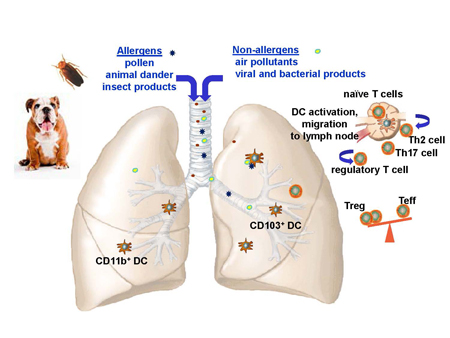Inflammatory Cell Recruitment
-

-
Donald N. Cook, Ph.D.
Principal Investigator -
Tel 984-287-4094
Fax 919-541-4133
[email protected] -
P.O. Box 12233Mail Drop D2-01Durham, NC 27709

Research Summary
Donald N. Cook, Ph.D., heads the Immunogenetics Group and holds a secondary appointment in the NIEHS Epigenetics and RNA Biology Laboratory. The Immunogenetics Group uses genetic, immunologic and microscopic imaging approaches to understand molecular mechanisms underlying allergic responses to inhaled allergens. Allergic sensitization through the airway is dependent on pulmonary dendritic cells and their interactions with allergen-specific T cells. Accordingly, the group studies how allergens and adjuvants affect dendritic cell activation directly, and also indirectly, by reprogramming of lung epithelial cells.
Major areas of research:
- The molecular mechanisms underlying allergic sensitization to inhaled allergens
- The roles of individual pulmonary dendritic cell subsets in allergic airway disease
- Molecular cross-talk between epithelial cells and dendritic cells
Current projects:
- Bacterial product-mediated allergic sensitization through the airway
- The roles of pulmonary dendritic cell subsets in the maintenance of allergic airway disease
- Epigenetic regulation of epithelial and dendritic cell function
Cook earned his Ph.D. in microbiology and immunology at McGill University in Montreal, Canada. Cook has published more than 70 peer-reviewed articles in leading biomedical journals as well as several book chapters. Cook served as a principal scientist at the Schering-Plough Research Institute and then as an Assistant Professor in the Division of Pulmonary and Critical Care Medicine at Duke University, before joining NIEHS in 2005.
Relevance to NIEHS Mission
Understanding how exposures to environmental agents impact allergic asthma is critical to the treatment and prevention of this widespread disease. Thus, much of our research is aimed at learning how various exposures perturb signaling pathways in different cell types of the lung, thereby leading to allergic sensitization and inflammation of the airway.


